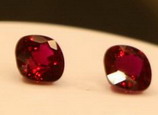
WASHINGTON, May 6 (Xinhua) -- Adding omega-3 fatty acids did not improve a combination of nutritional supplements commonly recommended for treating age-related macular degeneration (AMD), a new U.S. government study has found.
The plant-derived antioxidants lutein and zeaxanthin also had no overall effect on AMD when simply added to the combination, according to the study published online Monday in the Journal of the American Medical Association.
Age-related macular degeneration is the leading cause of blindness in the developed world, said the researchers. Without more effective ways of slowing progression, the number of persons with advanced AMD is expected to double over the next 20 years.
Previous studies have established that daily high doses of vitamins C and E, beta-carotene, and the minerals zinc and copper can help slow the progression to advanced AMD. However, beta- carotene use has been linked to a heightened risk of lung cancer in smokers. And there have been concerns that the high zinc dose could cause minor side effects, such as stomach upset, in some people.
Researchers at the National Eye Institute, part of the U.S. National Institutes of Health, launched a five-year age-related eye disease study (AREDS) in 2006 to test whether the original formulation could be improved by adding omega-3 fatty acids; adding lutein and zeaxanthin; removing beta-carotene; or reducing zinc. More than 4,000 people aged 50 to 85, who are at risk for advanced AMD, participated in the study.
Omega-3 fatty acids are produced by plants, including algae, and are present in oily fish such as salmon. Lutein and zeaxanthin are carotenoids, a class of plant-derived vitamins that includes beta-carotene; both are present in leafy green vegetables. Prior studies had suggested that diets high in lutein, zeaxanthin, and omega-3 fatty acids protect vision.
The investigators found no overall additional benefit from simply adding omega-3 fatty acids or lutein and zeaxanthin to the formulation. However, they did find some benefits when they analyzed participants who took an AREDS formulation with lutein and zeaxanthin but no beta-carotene.
In addition, there was also no apparent effect of beta carotene elimination or lower-dose zinc on progression to advanced AMD, according to the study.
"While zinc is an important component of the AREDS formulation,. .. it is unclear how much zinc is necessary. Omega-3 fatty acids and beta-carotene clearly do not reduce the risk of progression to advanced AMD," said lead researcher Emily Chew, deputy clinical director at the National Eye Institute.
















 2 killed, 1 injured in man's street knife attacks in Beijing | Attacker named
2 killed, 1 injured in man's street knife attacks in Beijing | Attacker named


![]()
